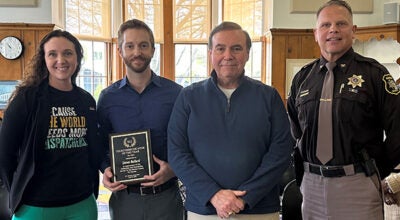Judge’s partial ruling favors Niles Twp. in suit against City of Niles over water/sewer agreements
Published 8:34 am Thursday, July 28, 2016
A Berrien County judge has ruled in favor of Niles Township on at least one key aspect of a lawsuit the township filed against the City of Niles in October, alleging the city violated contracts it has with the township for the use of the city’s sanitary sewer and water services.
Judge John Donahue ruled earlier this month that the city’s 10 percent payment in lieu of taxes (PILOT) transfers from the city’s water and sewer utilities to the general fund were “arbitrary and capricious and unreasonable.” The judge also ruled that while the city has the ability to implement PILOT transfers, the city did not use the right methodology for determining the amount that could be transferred.
Township officials said they hope the ruling will bring about a conclusion to the lawsuit, which was filed in October of 2015.
“I think the judge has given us guidelines and I would like to see the two parties sit down and come to a common conclusion and settle this, which is fair to everybody,” said Terry Eull, Niles Township clerk.
The entire judgement can be read here.
Jim Ringler, township treasurer, said he believes the court will enter further orders to implement the judge’s opinion. This would include, he said, recalculating and reducing the PILOT transfer to a lawful amount and returning excess PILOT monies to the utility funds from which they came.
Niles Mayor Mike McCauslin said, although he is disappointed with the result, he is pleased that the court upheld the issue of a municipality being able to use a PILOT.
“Now it is back on us to determine what is an appropriate PILOT and how to substantiate that,” he said.
Jeff Dunlap, the city’s director of utilities, said the city is still in the process of figuring out how to determine what a proper PILOT amount would be.
McCauslin said city officials had no way of knowing the PILOT transfers would have resulted in this legal issue.
“We sought legal counsel with attorneys that specialize in city laws, township laws, state laws… we were informed that the PILOT was perfectly legal,” he said.
McCauslin said the next step is for the city to determine what constitutes an appropriate PILOT, so that the court can determine a proper remedy.
Ringler and Eull both said the court has yet to address other aspects of the lawsuit and that the process could be a long way from over.
So, what is a PILOT? Township officials explained, in simple terms for this case, that it is an amount of money a municipality can collect from a piece of property it owns in lieu of taxes that would have been collected by the municipality had the same property been owned by a private individual.
How to determine that number remains unclear, according to both township and city officials.
Based on the judge’s ruling, it appears the judge took issue with the way the city determined the amount of the PILOT transfers (10 percent from both the water and sewer utilities). The city based that amount on what it needed to overcome a budget shortfall, according to testimony, instead of a calculation based on tax potential for both utilities.
Lawsuit background
The lawsuit stems from the Niles City Council’s decision in August 2013 to combat a budget shortfall by transferring money into the general fund from the city’s wastewater and water utilities divisions.
These transfers came in the form of 10 percent PILOT contributions from the city-owned sewer and water utility divisions.
In the lawsuit, the township argues that the PILOT transfers depleted the reserve funds of the water and wastewater utilities, causing the city to raise its water and sewer rates in order to make up for the shortfall.
This affects the township because some of its residents pay for and receive sewer and water supply services from the City of Niles under contracts that began in 2008 and 2012.
The lawsuit alleges that more than $774,000 has been transferred to the city’s general fund in the form of PILOT contributions from October 2013 to May 2015. The end result, the suit alleges, is that Niles Township and its residents are being required to pay increased water and sewer rates in order to fund general city operations, such as hiring police and fire personnel, and funding capital projects.
In the suit, the township argues that the city’s PILOT transfers and subsequent rate increases are in violation of its 2008 sewer and 2012 water contracts with the city.
The suit also alleges that some of the rates attributable to the PILOT transfers constitute a disguised tax, rather than a valid user fee, and therefore violate the Headlee Amendment to the Michigan Constitution, which prohibits the imposition of a new or increased tax without prior voter approval.
Ringler said Judge Donahue has not addressed the Headlee Amendment issue yet.
The township is asking that the city cease taking money out of the water and sewer reserve funds through the form of PILOT transfers and to return any money that has already been transferred back into those funds.






